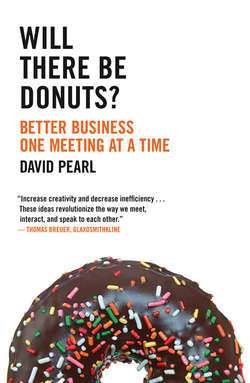Читать книгу Will there be Donuts?: Start a business revolution one meeting at a time - David Pearl - Страница 39
The True Cost of Nearly Meeting
ОглавлениеNearly meeting is exacting a huge cost not just on us and our businesses but on our planet.
Great meetings can save the world. Bad ones can really harm it. I can think of no better opportunity of a world-sized missed opportunity than the 2009 United Nations Climate Change Conference in Copenhagen. I wasn’t there, but I’ve heard from friends who were that it was a fiasco. A nearly meeting on an epic scale. With epic consequences.
The problems started even before you got into the conference venue. Thanks to inadequate—or willfully negligent—planning, entry lines stretched for hundreds of yards and required ticket holders to stand in the open air, sometimes for several hours, in polar conditions, without the comfort of heating, refreshments, or even a coffee. Coffee sellers wanted to set up concessions but were not allowed to. It was as though the Danes, normally quite welcoming folk, wanted to discourage people from attending.
There wasn’t even a fast-track entrance for VIPs. Ashok Khosla, Chairman of the New Delhi-based social enterprise, Development Alternatives, who is also the current President of the International Union for the Conservation of Nature (IUCN) found himself grid-locked in a non-moving mass of humanity and was clearly about to miss his speaking slot. If you know sustainable development, you know of Ashok. He’s been described by the United Nations Environment Programme as “a legend in the realm of sustainable development, and an individual who personifies the hopes and dreams of billions trapped in the indignity of acute deprivation.” This didn’t impress the slab-faced security guards. He only managed to get to the front of the line by distracting one of them by making a comment on her guard-dog’s condition.
Once inside (and many people gave up before they ever managed to enter), the problems were worse. The unlovely venue, wonderfully misnamed as the Bella Centre, seemed custom-designed to make you lose your way—a maze of small committee rooms and misleading signs.
There is a well-known YouTube film of the then British Prime Minister, Gordon Brown, sweeping confidently into what he thinks is a meeting room only to find himself in a cupboard. President Obama likewise had to go on a peek-a-boo treasure hunt through the corridors to find that his meeting with the Chinese delegation was already underway without him.
The Chinese premier was in the building (like Elvis) but famously refused to meet his U.S. counterpart face to face. Brinksmanship? Diplomatic theater? Or an unwillingness to have a real meeting?
Guardian journalist Mark Lynas was in no doubt: “The Chinese premier, Wen Jinbao, did not deign to attend the meetings personally, instead sending a second-tier official in the country’s foreign ministry to sit opposite Obama himself. The diplomatic snub was obvious and brutal, as was the practical implication: several times during the session, the world’s most powerful heads of state were forced to wait around as the Chinese delegate went off to make telephone calls to his ‘superiors’.”
This was pure power politics—nearly meeting at its most blatant. Clearly at a meeting like this, each nation will have its own agenda to pursue. In some cases, minimizing perceived threats to their economic growth; in others, like the Maldives, literally keeping their heads above rising seawater.
This need not have been a problem, had the participants really wanted to use this meeting to make the world a cleaner and safer place. But they did not. China and others clearly had no intention of playing anything but their own game. And as we are going to see a little later, intention is all.
The power plays of Copenhagen set the precedent for COP 17 in Durban in 2011, where we were treated to the unedifying sight of Saudi Arabia’s oil sheikhs holding the meeting—and the world—to ransom by insisting that they be compensated for losses they would suffer if the world stopped burning fossil fuels. As the Economist reported:
Most of the scores of diplomats present were appalled. Not least those from small island nations, like Kiribati and Tuvalu, which are likely to disappear beneath the rising seas long before the Saudis have drained their last well. But it mattered naught … After a fraught few hours of bickering, the Saudis got their wretched commitment.
That’s nearly meeting. In place of collaboration there is bargaining. An opportunity for joint action descends into a clash of competing ideologies. I was in a meeting recently where Trevor Manuel, formerly Nelson Mandela’s finance minister and currently the head of South Africa’s Planning Commission, summed up the limits of this approach. “Ideology means you know the answer before you hear the question.” Instead of real conversation you get ping-pong rallies of pre-prepared attitudes and opinion.
The COP events are a particularly high-stakes unforced error. But I would suggest that every nearly meeting we hold goes some way to destroying value in our world.
Nearly meetings are not just unproductive, they are counterproductive because they undermine our trust in the power of really meeting.
And really meeting can change the world …
* As US computer pioneer Alan Kay pointed out, “technology” is a name we give to any technical advance invented after we were born. For my parents’ generation, the color television came under the heading of technology. Not for mine. Television was as normal as plumbing. For us it’s laptops and wifi. Who knows what our kids will think of and see as technology? Looking back, though, there must have been a time when a table with four legs was the most advanced, jaw-dropping meeting technology on the planet. I’d like to have been there to see that.
